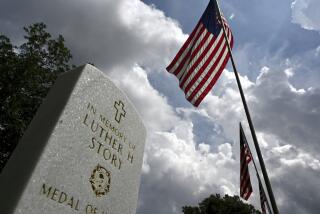Holocaust Survivor Awarded Medal of Honor
- Share via
WASHINGTON — Tibor Rubin watched as American troops liberated the Austrian concentration camp where he labored.
He pledged to himself that one day he would join that country’s Army as a measure of thanks. He did that, then he volunteered to fight in Korea.
But despite saving “his brothers” on the battlefield and in a prisoner of war camp, Tibor Rubin had to wait more than half a century for his own thanks.
On Friday, the former Army corporal was awarded the Medal of Honor.
“By repeatedly risking his own life to save others, Cpl. Rubin exemplified the highest ideals of military service,” President Bush said as he presented the 76-year-old Garden Grove man with the nation’s highest military honor.
Rubin’s wife, Yvonne, and his children, Frank and Rosalyn, sat in the front row.
“Thank you,” the president said, quietly and directly to Rubin as he fastened a blue ribbon with a five-pointed gold star around his neck.
After the ceremony, Rubin was inducted at the Pentagon into the Hall of Heroes and was given a Medal of Honor flag.
Since Congress created the honor during the Civil War, 3,461 Medals of Honor have been presented for extreme valor.
“There’s no way I can describe what this means,” Rubin said in an interview this week. “I waited for this for 55 years, and finally the dream came true.”
Four times, Rubin’s fellow soldiers and commanding officers recommended that he receive the Medal of Honor. Twice they recommended him for the Silver Star and twice for the Distinguished Service Cross.
He left the Army with two Purple Hearts.
His comrades contended that the man assigned to submit recommendations for valor awards, Rubin’s sergeant, never did so because Rubin was Jewish.
“I really believe, in my heart, that [the sergeant] would have jeopardized his own safety rather than assist in any way whatsoever in the awarding of the medal to a person of Jewish descent,” Cpl. Harold Speakman, who served with Rubin, wrote in a notarized affidavit.
“This man did, with full knowledge of his actions, withhold the recommendations from the proper channels, therefore depriving this soldier of the medals which he so rightfully deserves,” he wrote.
Rubin said the sergeant repeatedly chose him for dangerous missions.
“He used to call me such bad names that I forgot my name was Tibor Rubin,” he said. “He would send me to the most difficult positions so that I would be killed. It scared the hell out of me. I couldn’t even hold my rifle, but I still went.”
In 2001, Congress instructed the Defense Department to review the records of Jewish and Latino war veterans who may have been denied the Medal of Honor because of discriminatory practices.
Rubin’s name jumped to the top of the list.
“The evidence from the notarized documents is that [Rubin’s] first sergeant did the circular trashcan on these [recommendations] and did not process them,” said Maj. Elizabeth Robbins, an Army spokeswoman. “Rubin is a true American hero and deserves this honor.”
In the early 1940s, Rubin and his family were forced from their hometown in Hungary and were brought with thousands of others to Dr. Josef Mengele, the notorious Nazi concentration camp physician.
“Dr. Mengele told us to go left or right,” Rubin said. “If you went left, you went to a gas chamber. If you went right, you went to work in a labor camp.”
Rubin was sent to the right; his mother and sister to the left. He never saw them again.
They died in a gas chamber at Auschwitz.
His father survived Auschwitz but was later killed at Buchenwald, another concentration camp.
Rubin spent 14 months in Mauthausen, an Austrian concentration camp where the overpowering stench of rotting corpses constantly reminded him of his own mortality.
In May 1945, U.S. forces liberated the camp. Three years later, Rubin immigrated to the United States.
Fulfilling a pledge he made to himself when American soldiers liberated him, he enlisted in the Army in February 1950.
Soon after, Rubin volunteered to fight in Korea, although, he said, he was told he was exempt from going to a war zone because he was not an American citizen.
“My commander told me that I didn’t have to go to war,” Rubin said. “So I told him, ‘Well, what about the others? I cannot leave my fellow brothers.’ ”
During one mission, Rubin single-handedly defended a hill for more than 24 hours against hundreds of North Korean soldiers, allowing his company to retreat to safety, Bush noted in his speech.
“The Koreans were coming up the hill,” Rubin recalled. “There were so many, they looked like ants. I didn’t have too much time to get scared, so I went crazy.
“I was like a machine, a robot. I ran around to every foxhole on the hill and started throwing hand grenades and shooting my rifle to make as much noise as possible.”
In October 1950, after he was wounded by grenade shrapnel in his hand, chest and leg, Rubin was held for 30 months with other Americans at a North Korean prisoner of war camp they called “Death Valley.”
According to several accounts, Rubin risked his life nightly, crawling on his stomach across the camp to steal vegetables and barley for the soldiers.
“If they caught me taking food, they would have shot me right on the spot,” Rubin said. “I was doing what I could to keep my brothers alive. I needed to care for them.”
Defense Secretary Donald H. Rumsfeld said: “Rubin’s accomplishments are amazing. It’s been a long time coming, but it’s wonderful that this has happened.”
More to Read
Sign up for Essential California
The most important California stories and recommendations in your inbox every morning.
You may occasionally receive promotional content from the Los Angeles Times.













